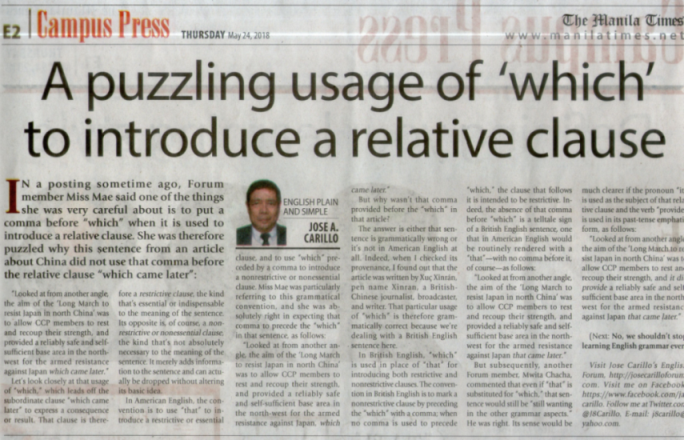In a posting sometime ago, Forum member Miss Mae said one of the things she was very careful about is to put a comma before “which” when it is used to introduce a relative clause. She was therefore puzzled why this sentence from an article about China did not use that comma before the relative clause “which came later”:
“Looked at from another angle, the aim of the ‘Long March to resist Japan in north China’ was to allow CCP members to rest and recoup their strength, and provided a reliably safe and self-sufficient base area in the north-west for the armed resistance against Japan
which came later.”
Let’s look closely at that usage of “which,” which leads off the subordinate clause “which came later” to express a consequence or result. That clause is therefore a
restrictive clause, the kind that’s essential or indispensable to the meaning of the sentence. Its opposite is, of course, a
nonrestrictive or nonessential clause, the kind that’s not absolutely necessary to the meaning of the sentence. It merely adds information to the sentence and can actually be dropped without altering its basic idea.
IMAGE CREDIT: CLICKENGLISHSCHOOL.COMIn American English, the convention is to use “that” to introduce a restrictive or essential clause, and to use “which” preceded by a comma to introduce a nonrestrictive or nonessential clause. Miss Mae was particularly referring to this grammatical convention, and she was absolutely right in expecting that comma to precede the “which” in that sentence, as follows:
“Looked at from another angle, the aim of the ‘Long March to resist Japan in north China’ was to allow CCP members to rest and recoup their strength, and provided a reliably safe and self-sufficient base area in the north-west for the armed resistance against Japan
, which came later.”
But why wasn’t that comma provided before the “which” in that article?
The answer is either that sentence is grammatically wrong or it’s not in American English at all. Indeed, when I checked its provenance, I found out that the article was written by Xuç Xînrán, pen name Xinran, a British-Chinese journalist, broadcaster, and writer. That particular usage of “which” is therefore grammatically correct because we’re dealing with a British English sentence here.
In British English, “which” is used in place of “that” for introducing both restrictive and nonrestrictive clauses. The convention in British English is to mark a nonrestrictive clause by preceding the “which” with a comma; when no comma is used to precede “which,” the clause that follows it is intended to be restrictive. Indeed, the absence of that comma before “which” is a telltale sign of a British English sentence, one that in American English would be routinely rendered with a “that”—with no comma before it, of course—as follows:
“Looked at from another angle, the aim of the ‘Long March to resist Japan in north China’ was to allow CCP members to rest and recoup their strength, and provided a reliably safe and self-sufficient base area in the north-west for the armed resistance against Japan
that came later.”
But subsequently, another Forum member, Mwita Chacha, commented that even if “that” is substituted for “which,” that sentence would still be “still wanting in the other grammar aspects.” He was right. Its sense would be much clearer if the pronoun “it” is used as the subject of that relative clause and the verb “provide” is used in its past-tense emphatic form, as follows:
“Looked at from another angle, the aim of the ‘Long March to resist Japan in north China’ was to allow CCP members to rest and recoup their strength, and
it did provide a reliably safe and self-sufficient base area in the north-west for the armed resistance against Japan
that came later.”
Got that important grammatical distinction between essential and nonessential relative clauses?
 This essay appeared in the column “English Plain and Simple” by Jose A. Carillo in the Campus Press section of the May 24, 2018 issue (print edition only) of
This essay appeared in the column “English Plain and Simple” by Jose A. Carillo in the Campus Press section of the May 24, 2018 issue (print edition only) of The Manila Times
, © 2018 by the Manila Times Publishing Corp. All rights reserved.(Next:
No, we shouldn’t stop learning English grammar ever) May 31, 2018